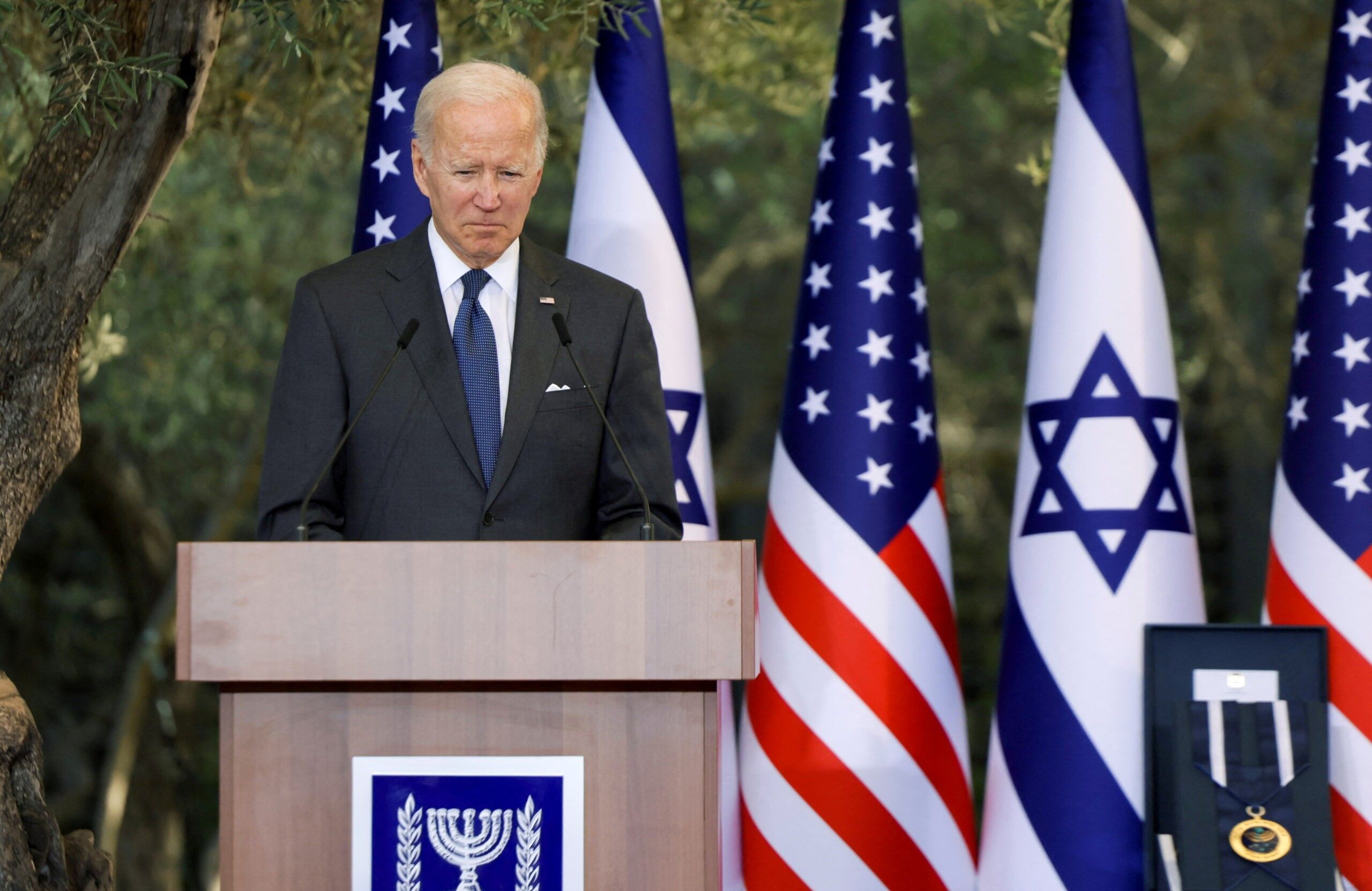Israel’s finance minister has blocked a major U.S. shipment of humanitarian aid meant to feed Palestinians in the Gaza Strip, according to Axios, setting up a faceoff with the Biden administration, which has come under increasing pressure from Democrats in Congress to increase the flow of aid into the besieged territory.
The news comes just days after President Joe Biden issued a memorandum in which he committed to enforce a little-used provision of U.S. law that bans Washington from giving security assistance to states that block U.S. humanitarian aid. The memorandum drew heavily on a proposal from Sen. Chris Van Hollen (D-Md.) that called for the implementation of U.S. law restricting military aid for human rights violators.
Biden now finds himself in a bind: He can ignore the memo and anger his allies in the Senate; cut off military aid to Israel; or issue a waiver that would allow shipments to continue while conceding that Israeli actions are contrary to U.S. law.
“The most likely possibility is that the president says, ‘Yes, there's been a restriction, but because of the importance of supporting Israel, we're going to waive,’” said John Ramming Chappell, an advocacy and legal fellow at the Center for Civilians in Conflict. A waiver, Ramming Chappell argues, “would require being honest about the fact that the Israeli government is restricting the delivery of humanitarian assistance.”
Such an admission would be embarrassing for the administration given its repeated declarations that it has not seen credible allegations of Israeli war crimes, a view at odds with the assessment of all major human rights organizations and even U.S. allies.
“If you believe that too many people are being killed, maybe you should provide less arms in order to prevent so many people having been killed,” charged European Union foreign policy chief Josep Borrell on Monday, following Biden’s comment that Israeli operations have been “over the top.”
As Israel faces charges of genocide at the International Court of Justice, the Biden administration is reportedly conducting internal reviews of Israel’s compliance with the laws of war, an important question given the scale of U.S. military aid to the country.
The White House did not respond to a request for comment from RS. State Department spokesperson Matthew Miller said yesterday that “the Israeli government made a commitment to allow the flour to go in, and we expect them to implement this commitment.”
The flour in the shipment, which is currently sitting in the Israeli port of Ashdod, would be sufficient to feed 1.5 million Palestinians in Gaza for five months, according to Miller. United Nations experts estimate that one in four Gazans is now experiencing extreme famine conditions, indicating widespread starvation.
Bezalel Smotrich, Israel’s finance minister, reportedly blocked the U.S. humanitarian aid because it was destined for distribution by the U.N. Relief and Works Agency, or UNRWA. Israeli officials recently accused a dozen of UNRWA’s 10,000 Gaza-based employees of participating in or facilitating the Oct. 7 Hamas attacks, which killed nearly 1,200 people, most of whom were civilians.
While Israel has yet to provide evidence for the accusations, many countries, including the U.S. and Germany, have paused funding for the U.N. agency pending an investigation. UNRWA, for its part, has cut ties with the accused employees and urged states to reverse course on funding cutoffs. The agency says a continued suspension of funding could have catastrophic consequences in Gaza, which is already facing one of the world’s worst humanitarian crises.
Smotrich’s office told Axios that he is now looking for a mechanism to deliver the aid without going through UNRWA, which he alleges is part of the “Hamas war machine.”
The decision to hold up aid throws another wrench into the Biden administration’s efforts to pass a funding package that includes billions of dollars in assistance for Ukraine and Israel. The package made it through the Senate Tuesday, but its odds of passing the House continue to dwindle due to progressive opposition to Israel aid and conservative opposition to Ukraine aid.
In a House hearing Wednesday, Rep. Joaquin Castro (D-Texas) asked Bonnie Jenkins, a top State Department official on arms control, if the new memorandum would be applied to Israel.
“It’s going to be applied to all countries,” Jenkins said. “We have talked to Israel about the NSM, and they are aware of it and agreed to it.”
But Jenkins punted when asked if the U.S. had secured assurances from Israel that it will allow the provision of U.S. humanitarian aid to Gaza, noting that the memorandum allowed up to 45 days for a state to provide such assurances if it is actively at war.
- Aid for Israel and Ukraine is not an American jobs program ›
- Lawmakers ask Biden to investigate Israel's use of US arms ›
- US wants Turkey to pick up its UNRWA tab: Report | Responsible Statecraft ›
- State Dept: No evidence Israel violating laws with US weapons | Responsible Statecraft ›
















